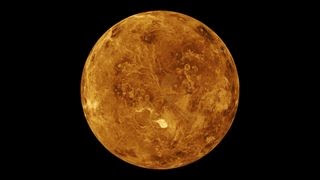Venus, as seen by NASA’s Magellan spacecraft. Image
courtesy of NASA/JPL.
Joel Kontinen
“Scientists have identified a water-loss mechanism
on Venus that
could explain how the once water-rich world became completely parched.”
A “molecule high in Venus' atmosphere, water escaped
Venus at double the rate previously estimated. As faster water loss means less
time is needed to boil away the planet's water reservoir, scientists say Venus
may have harbored oceans — and potentially habitable conditions — for longer
than previously thought before the drying process began.”
According to some evolutionists, "this would
provide more time for possible
life to
arise," study co-author Eryn Cangi, a research scientist at the Laboratory
for Atmospheric and Space Physics (LASP) ,”
“Prior studies suggest that both Venus and Earth likely received similar amounts of water early in their history, mostly from water vapor-spewing volcanoes and icy comets that frequently bombarded the worlds.”
But only God can give life to a planet,
Source;
Sharmila
Kuthunur 2024.















